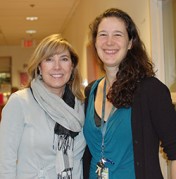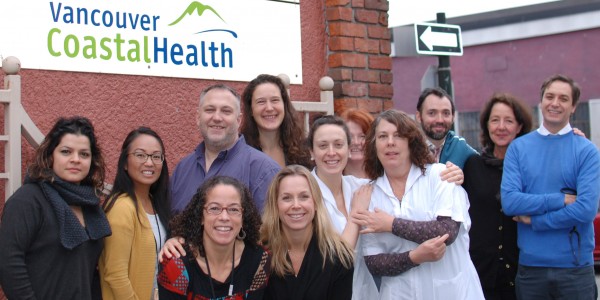Becoming Hep C free
The Downtown Community Health Centre (DCHC) team is celebrating their new Hepatitis C treatment program that has eight patients receiving treatment and three patients already virus free.
“It’s been a real learning curve since we were trained in May,” says Dr. Deborah Kason, a DCHC family doctor who received training to treat Hepatitis C in the community. She works on an interdisciplinary team with support from Dr. Mark Hull, a specialist in infectious disease, who also practices in HIV and viral hepatitis at St. Paul’s Hospital.
“Everything we did until a few months ago was totally new to us as a team,” she says. “Now we’re gaining confidence and I think it’s pretty amazing what we’ve accomplished in a short period of time.”
Treatment has changed
The symptoms of chronic Hepatitis C, a disease caused by a virus that infects the liver, can take many years to surface. If left untreated, the virus can cause severe liver damage and even failure. It also increases the risk of liver cancer.
“Unfortunately it’s a disease that often takes a back seat in care plans because other issues are more pressing,” says Lesley Gallagher, a clinical nurse educator who has been part of Pender Community Health Centre’s internationally-recognized Hepatitis C program since 2005. “But now there’s actually talk in the larger medical community of the potential to eliminate this chronic disease through medication. That’s huge!”
Treatments have historically been lengthy and complicated; most took 48 weeks to complete and often needed a hospital-based team of experts. Now with more tolerable and efficacious drugs, patients can undergo community-based therapy in as little as 12 weeks.
Patient success
Patients are successfully moving along in their treatment plan—not dropping off—which Dr. Kason believes is because of the multidisciplinary approach.
“We [family doctors and nurse practitioners] can discuss and support all aspects of care with the pharmacists, registered nurses, licensed practical nurses and counsellors on the team,” she explains. “If a patient is weak and can’t come into the clinic, a nurse will visit them at home. Our dietitian can discuss strategies with a patient for eating when they’re not feeling well. Plus, our counsellors and nurses hold weekly group sessions to talk about Hepatitis C, including the medical and psychological aspects of treatment.”
Starting treatment
“There’s a lot of on the ground, hands-on work that needs to be done before patients can start treatment,” says Lesley, referring to the work of the primary care teams.
This includes diagnosing and staging infection for new patients and reconnecting with individuals already diagnosed who may now be eligible for treatment. The teams also provide education and arrange tests such as an ultrasound and blood work.
During treatment, all aspects of a client’s health need to be supported. Clinicians check-in with patients at least once a week.

Clinical nurse educators Lesley Gallagher from Pender CHC (left) and Adrienne Jinkerson from DCHC (right).
A concerted program
Vancouver primary care and mental health and addiction teams got together in 2013 to establish a framework for all stages of care. Since then, teams have been building local models, using the expertise of already-established programs and guidance from specialists at Vancouver General and St. Paul’s hospitals. Clinicians were also offered training.
“We have lots of support from Hep C experts like Drs. Hull and Ramji at St. Paul’s Hospital and the Pender team,” says Dr. Kason. “Now, our patients can stay at DCHC and no longer have to travel to Pender Clinic or Vancouver Native Health Clinic for treatment.”
“There are parallels to HIV in how the disease has evolved,” says Misty Bath who is taking on the program coordinator role for all sites in Vancouver. “We’ve come a long way for HIV and the same could hold true for Hep C if we can build on this momentum.”
“At the end of the day, it’s better for clients,” she says. “They don’t have to live with this disease.”


Kelvin Bei
Congratulations and well done DCHC and Pender Team!